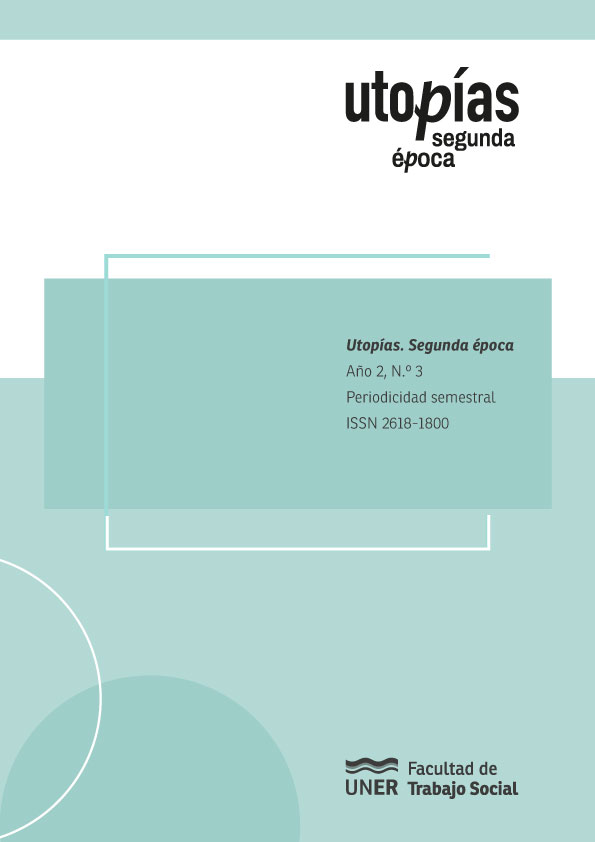The craft of working with concepts. Tricks of its teaching in university training in social work
Main Article Content
Abstract
The experience of teaching research in the social work career allowed us to identify a common need for tools that facilitate working with concepts. We share a trick of the teaching profession: the construction of two scaffolds that help to order issues and currents of thought that often appear fragmented. The first scaffolding addresses the historicity and transversality of theories and the second focuses on the fundamentally philosophical turns that have influenced scientific and social thought and that are present in university training in social work. It is an introductory text open to the intervention of the readers.
Downloads
Article Details

This work is licensed under a Creative Commons Attribution-NonCommercial-ShareAlike 4.0 International License.
Las ediciones no tienen cargos para las y los autores ni para las y los lectores, y se incita a las y los autores a depositar sus contribuciones en otros repositorios institucionales y temáticos, con la certeza de que la cultura y el conocimiento son un bien de todos y para todos. Utopías. Segunda época permite la reutilización luego de su edición (Post print) citando la autoría y la fuente original de su publicación. Su uso no puede ser con fines comerciales.
References
Archenti, N. (2018). El papel de la teoría en la investigación social. En Marradi, Archenti y Piovani, Metodología de las ciencias sociales. Siglo XXI.
Becker, H. (2010). Trucos del oficio. Cómo conducir su investigación en ciencias sociales. Siglo XXI.
Bourdieu, P. (1997). Razones prácticas. Sobre la teoría de la acción. Editorial Anagrama.
De Oto, A. (2017). Notas metodológicas en contextos poscoloniales de investigación. En A. Alvarado & A. De Oto (Eds.), Metodologías en contexto: intervenciones en perspectiva feminista, poscolonial, latinoamericana (pp. 123-145). CLACSO.
Díaz, E. (2017). Problemas filosóficos. Biblos.
Durkheim, E. (2009). El suicidio. Ediciones Libertador.
Foucault, M. (2010). La arqueología del saber. Siglo XXI.
Freud, S. (1970). El malestar en la cultura. Alianza.
Gadamer, H. G. (1999). Verdad y método. Ediciones Sígueme.
Grassi, E. (2007). Problemas de naturalismo y teoricismo en la investigación social y en Trabajo Social. Revista Katálysis, 10(spe), 26–36. https://www.scielo.br/scielo.php?script=sci_arttext&pid=S1414-49802007000300003
Haraway, D.J. (1995). Ciencia, cyborgs y mujeres. La reinvención de la naturaleza. Cátedra.
Heidegger, M. (2009). Ser y tiempo. FCE.
Kant, I (1984 [1781]). La crítica de la razón pura. Orbis.
Lander, E. (Ed.) (2000). La colonialidad del saber: eurocentrismo y ciencias sociales. Perspectivas latinoamericanas. CLACSO.
Macon, C. (2020). Prólogo: Lauren Berlant: el sonido, la furia (y los afectos). En Berlant, L., El optimismo cruel. Caja Negra Editores.
Marx, C. y Engels, F. (1973). La ideología alemana. Pueblos Unidos.
Marx, C. (2008). El manifiesto comunista. Ediciones Libertador.
Merton, R. (1964). Teorías y estructuras sociales. FCE.
Naishtat, F. (2010). Los «giros» filosóficos y su impronta metafilosófica. En O. Nudler (Ed.), Filosofía de la filosofía (pp. 215-253). Trotta.
Nietzsche, F. (1961). La genealogía de la moral. Aguilar.
Ricoeur, P. (1999, [1965]). Freud: una interpretación de la cultura. Siglo XXI.
Ripamonti, P. (2017). Investigar a través de narrativas: notas epistemo-metodológicas. En: Alvarado y De Oto, Metodologías en contexto: intervenciones en perspectiva feminista, poscolonial, latinoamericana. CLACSO.
Weber, M. (2012). Ética protestante y el espíritu del capitalismo. Biblioteca Nueva.
Ynoub, R. (2011). El proyecto y la metodología de la investigación. Cengage Learning Argentina.
Zapata Silva, C. (2018). El giro decolonial. Consideraciones críticas desde América Latina. Pléyade, 21(enero-junio), 49-71. https://doi.org/ISSN 0719-3696
